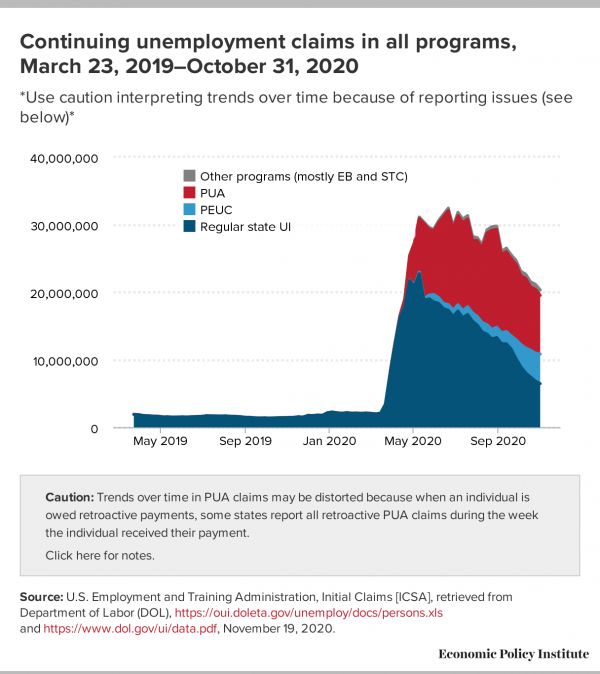https://www.epi.org/blog/no-improvement-in-initial-unemployment-claims-as-labor-market-gains-falter/
Another 1.1 million people applied for unemployment insurance (UI) benefits last week, including 742,000 people who applied for regular state UI and 320,000 who applied for Pandemic Unemployment Assistance (PUA). The 1.1 million who applied for UI last week was an increase of 55,000 from the prior week's figures. Last week was the 35th straight week total initial claims were greater than the worst week of the Great Recession. (If that comparison is restricted to regular state claims—because we didn't have PUA in the Great Recession—initial claims last week were still 3.3 times where they were a year ago.)
Most states provide 26 weeks of regular benefits, but this crisis has gone on much longer than that. That means many workers are exhausting their regular state UI benefits. In the most recent data, continuing claims for regular state UI dropped by 429,000, from 6.8 million to 6.4 million.
For now, after an individual exhausts regular state benefits, they can move on to Pandemic Emergency Unemployment Compensation (PEUC), which is an additional 13 weeks of regular state UI. However, PEUC is set to expire on December 26 (as is PUA).
In the latest data available for PEUC (the week ending October 31), PEUC rose by 233,000, from 4.1 million to 4.4 million, offsetting only about 60% of the 383,000 decline in continuing claims for regular state benefits for the same week. This is likely due in large part to the fact that many of the roughly 2 million workers who were on UI before the recession began, or who are in states with less than the standard 26 weeks of regular state benefits, are exhausting PEUC benefits at the same time others are taking it up. More than 1.5 million workers have exhausted PEUC so far (see column C43 in form ETA 5159 for PEUC here). Last week, 634,000 workers were on Extended Benefits (EB), which is a program that eligible unemployed workers in some states can get on if they've exhausted PEUC.
Figure A shows continuing claims in all programs over time (the latest data are for October 31). Continuing claims are nearly 19 million above where they were a year ago.

Senate Republicans allowed the across-the-board $600 increase in weekly UI benefits to expire at the end of July, so last week was the 16th week of unemployment in this pandemic for which recipients did not get the extra $600. And worse, as mentioned above, PUA and PEUC will expire in just over five weeks, on December 26—unless Congress acts. Millions of workers are depending on these programs—DOL reports that a total of 13.1 million workers were on PUA (8.7 million) or PEUC (4.4 million) during the week ending October 31. When these programs expire, millions of these workers and their families will be financially devastated.
An excellent new paper from The Century Foundation finds that 12 million workers will lose PUA or PEUC benefits when they expire on December 26—on top of the 4.4 million who will have exhausted them before then. It also finds that only 2.9 million will then be eligible for Extended Benefits. That means a total of 13.5 million workers (12.0 million + 4.4 million – 2.9 million) will have lost CARES Act unemployment benefits by the end of the year with nothing to fill in the gap.
The House passed a $2.2 trillion relief package that would extend the UI provisions in the CARES Act, but Senate Majority Leader Mitch McConnell has thus far blocked additional COVID relief, knowing full well that millions will see their benefits disappear on December 26 if he doesn't act. The cruelty is beyond belief.
And blocking more COVID relief is not just cruel, it's bad economic policy. UI is great stimulus. The spending made possible by pandemic UI benefits is supporting millions of jobs. Letting these benefits expire means cutting those jobs. There are now 25.7 million workers who are officially unemployed, otherwise out of work because of the virus, or have seen a drop in hours and pay because of the pandemic. And job growth is slowing. Stimulus is desperately needed.
Blocking stimulus is also exacerbating racial inequality. Due to the impact of historic and current systemic racism, Black and Latinx communities have seen more job loss in this recession, and have less wealth to fall back on. The lack of stimulus hits these workers the hardest, which means stimulus is a racial justice issue. Further, workers in this pandemic aren't just losing their jobs—millions of workers and their family members have lost employer-provided health insurance due to the COVID-19 downturn. Senate Republicans are failing struggling families.
-- via my feedly newsfeed

No comments:
Post a Comment